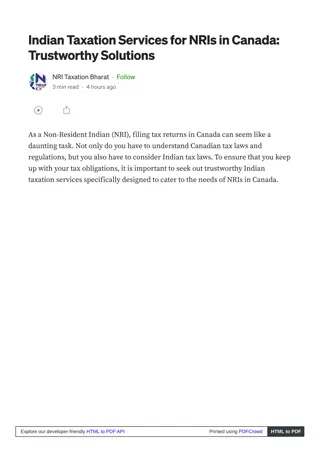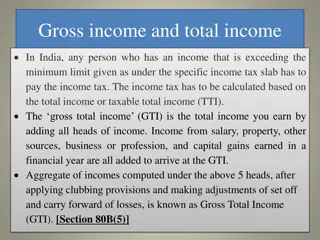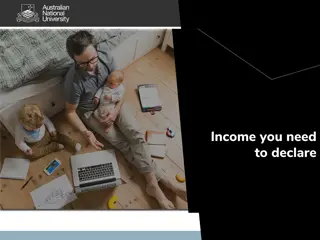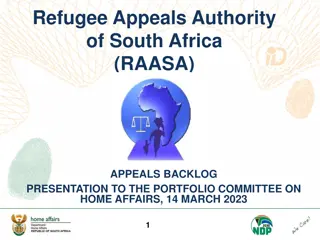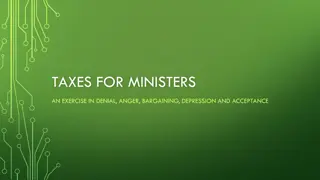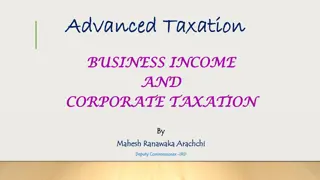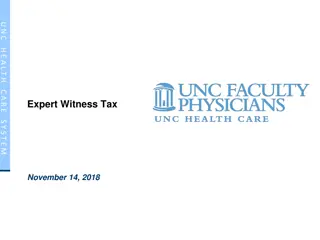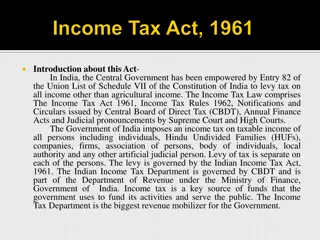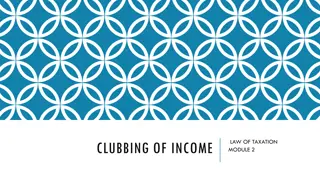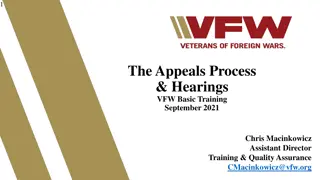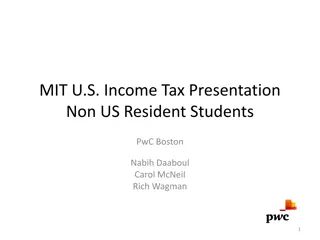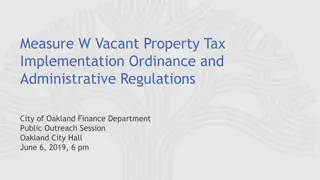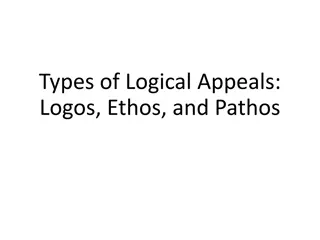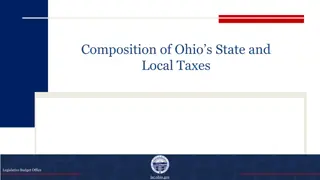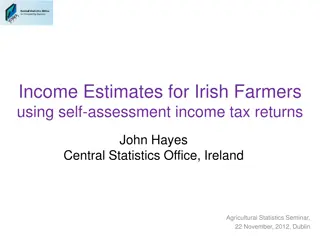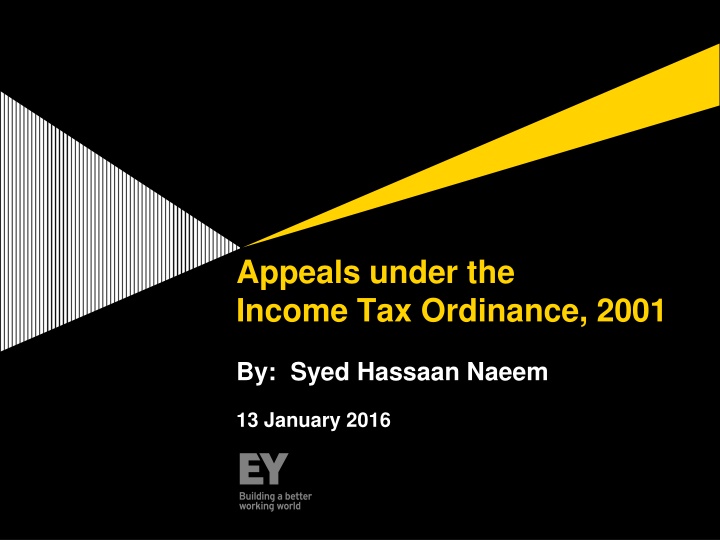
Understanding Appeals and Assessments under the Income Tax Ordinance 2001
"Learn about appeals, assessments, and definitions under the Income Tax Ordinance 2001. Explore the process of appeals, judicial examination, statutory rights, and common disputes between taxpayers and tax collectors."
Download Presentation

Please find below an Image/Link to download the presentation.
The content on the website is provided AS IS for your information and personal use only. It may not be sold, licensed, or shared on other websites without obtaining consent from the author. If you encounter any issues during the download, it is possible that the publisher has removed the file from their server.
You are allowed to download the files provided on this website for personal or commercial use, subject to the condition that they are used lawfully. All files are the property of their respective owners.
The content on the website is provided AS IS for your information and personal use only. It may not be sold, licensed, or shared on other websites without obtaining consent from the author.
E N D
Presentation Transcript
Appeals under the Income Tax Ordinance, 2001 By: Syed Hassaan Naeem 13 January 2016
Assessment ? The term assessment is derived from the term assess which has been defined in ordinary dictionaries as to fix the amount of, as a tax: to tax or fine: to fix the value or profits of, for taxation (with at): to estimate, judge Chambers English Dictionary Appeals under the Income Tax Ordinance, 2001 Page 3
Assessment - definition under the Ordinance Income Tax Ordinance, 2001 Section 2(5) assessment includes provisional assessment, re- assessment and amended assessment and the cognate expressions shall be construed accordingly; Appeals under the Income Tax Ordinance, 2001 Page 4
What is an appeal? The word Appeal is derived from the Latin word appellare meaning to address . The ordinary dictionary meaning is to make an earnest or formal request or to call attention An appeal is an application for the judicial examination of the decision of any inferior court, by a higher court An appeal is the right of entering a Superior Court and invoking its aid and interposition to redress the error of the Court below A complaint to a higher Tribunal, in which the error or injustice is sought to be corrected or reversed Appeals under the Income Tax Ordinance, 2001 Page 6
What is an appeal? The right of appeal is a statutory right, created by statute defining its limits as well. It is settled proposition of law that if a statute does not confer a right of appeal it does not exist Appeals under the Income Tax Ordinance, 2001 Page 7
What is an appeal? Most appeals arise on account of disagreement between the taxpayer and the tax collectors regarding the quantification of taxable income and tax liability as well as levy of default surcharge, penalties, etc. Appeals under the Income Tax Ordinance, 2001 Page 8
What is an appeal? There may also be disagreement over facts, figures or interpretation of law between the taxpayers and the tax collectors Sections 127, 131 & 133 To resolve such disagreements, the Ordinance lays down the procedure, which gives the taxpayers, the right of appeal before the Appellate authorities which include Commissioner Inland Revenue (Appeals), Appellate Tribunal Inland Revenue, and the High Court Appeals under the Income Tax Ordinance, 2001 Page 9
Who can appeal ? The person to whom the assessment, amended assessment or other order has been issued has the right of appeal In case of an individual, the individual himself; In case of an Association of Persons, any partner or member of the AoP; in case of a Company, the Principal Officer In case of a deceased individual, the legal representative of the deceased; and in case of an individual under legal disability or a non-resident person, his/ her representative Appeals under the Income Tax Ordinance, 2001 Page 10
Time Limit Appeal against order passed by Time limit of filing appeal To whom the appeal is made Commissioner 30 days Commissioner (Appeals) Commissioner (Appeals) 60 days Appellate Tribunal Appellate Tribunal 90 days High Court High Court 60 days Supreme Court Where the appeal is not filed within the specified time, the Commissioner (Appeals) or the Appellate Tribunal, as the case may be, are empowered to accept such an appeal provided an application explaining the reasons for not filing the appeal in time are given, and are accepted as such Appeals under the Income Tax Ordinance, 2001 Page 11
Appeal to Commissioner (Appeals) Appeal to the Commissioner (Appeals) has been provided for under section 127. There has been prescribed a complete procedure as to how the appeal is to be made to the Commissioner (Appeals) and what are the pre-requisites Section 127 Commissioner (Appeals) has been defined under Clause (13A) of section 2, to mean Commissioner (Appeals) means a person appointed as a Commissioner Inland Revenue (Appeals) under section 208 Appeals under the Income Tax Ordinance, 2001 Page 12
Appeal to Commissioner (Appeals) Section 127 provides appeal against the following orders - Section 127 Section 121 (Best judgment) Section 122 (Amended assessment) Section 124 (Appeal effect order) Sections 143 & 144 (Non-resident ship/ aircraft owner/ charterer) Sections 161 & 162 (Default for not collecting/ deducting tax) Section 170 (Refund order) Section 172 (Representative of a non-resident) Section 182 (Penalty order) Section 205 (Default surcharge) Section 221 (Rectification) Appeals under the Income Tax Ordinance, 2001 Page 13
How to lodge an appeal ? Section 127 The appeal should be filed by following the procedure prescribed which states that the appeal should be - On the prescribed form of appeal (Rule 76) Be verified in the prescribed manner Stating the grounds of appeal Prescribed fee should be paid; and Lodged within the time limit provided Appeals under the Income Tax Ordinance, 2001 Page 14
How to lodge an appeal ? Where the appeal is filed against an assessment order, admitted tax liability (under section 137(1) of the Ordinance) should have been paid by the taxpayer Section 127 A copy of memo and grounds of appeal is required to be sent to the concerned Commissioner and a certificate to that effect should be enclosed with the appeal Appeals under the Income Tax Ordinance, 2001 Page 15
Grounds of Appeal Grounds of appeal are the items of disagreement in an assessment, amended assessment or any other order along with the reasons for disagreement or why the appellant believes that the assessment, amended assessment or the order is incorrect The grounds of appeal should be: Written in Urdu or English; Precise and serially numbered Should not be argumentative but precisely state the grievance/ cause of action Preliminary objections like limitation/ jurisdiction should be given priority Appeals under the Income Tax Ordinance, 2001 Page 16
How to file the Appeal The following documents are to be submitted in duplicate with the Commissioner (Appeals) (a) Prescribed form and grounds of appeal (b) Demand notice (in original) and impugned order (c) Challan (CPR) of appeal fee (d) Certificate confirming that appeal memo has been sent to the Commissioner (e) Power of Attorney or Vakalatnama Appeals under the Income Tax Ordinance, 2001 Page 17
Powers of the Commissioner (Appeals) Sections 128 & 129 The Commissioner (Appeals) is empowered to entertain new ground of appeal not taken earlier by the appellant For this, an application may be prepared seeking permission of the Commissioner (Appeals) to raise the ground of appeal and filed before the hearing of appeal If the Commissioner (Appeals) is satisfied that the new ground of appeal is very much related to the case and omission of not taking the ground earlier was not willful or unreasonable, he may accept the ground of appeal A legal issue can be raised at any stage before the hearing of appeal is concluded Appeals under the Income Tax Ordinance, 2001 Page 18
Powers of the Commissioner (Appeals) Sections 128 & 129 The Commissioner (Appeals) is authorized to admit any documentary material or evidence which was not produced before the Commissioner only where the Commissioner (Appeals) is satisfied that the appellant was prevented by sufficient cause from producing such material or evidence in the earlier proceedings Appeals under the Income Tax Ordinance, 2001 Page 19
Powers of the Commissioner (Appeals) Sections 128 & 129 The Commissioner (Appeals) is also empowered to enhance the amount of assessment or reduce the refund, after giving a notice to the appellant of being heard Appeals under the Income Tax Ordinance, 2001 Page 20
Who can attend the appeal hearing The following persons are authorized to represent the taxpayer in appeal Section 223 a relative of the taxpayer or the taxpayer himself; a current full-time employee of the taxpayer; an officer of a schedule bank with which the taxpayer; maintains a current account or has other regular dealings; a legal practitioner entitled to practice in any Civil Court in Pakistan; an accountant; or an Income Tax Practitioner Appeals under the Income Tax Ordinance, 2001 Page 21
Preparing, conducting and arguing the appeal While preparing the grounds of appeal, all the facts should be thoroughly examined. All important aspects should be noted down, the reason of disagreement/ disallowance should be highlighted and all the evidences should be in place to support the case Unless you have command over the facts, you will not be in a position to apply the law and to find the relevant case law that is on all fours of the case Appeals under the Income Tax Ordinance, 2001 Page 22
Preparing, conducting and arguing the appeal It is preferable to prepare and submit written arguments before the Commissioner (Appeals) The written arguments should contain a summary of the impugned issues. The issues should be clearly expressed and have clarity of the views canvassed either on facts or law. The language used should be polite, courteous and respectful The historical back ground of the case should be incorporated and the issues should be discussed by firstly mentioning the reasons taken by the assessing officer and then controverting them with the facts of the case and with relevant law Appeals under the Income Tax Ordinance, 2001 Page 23
Preparing, conducting and arguing the appeal Alongwith the written submissions, the documents relied upon (details, evidences, etc.) and the case law referred to should be submitted It is advisable that the relevant excerpts on which emphasis is laid are highlighted so that these are noticed by the Commissioner (Appeals) Where the facts of the case demand that the case record should be examined, the Commissioner (Appeals) may be requested to call for the case record Books of account and other details, if warranted may also be submitted for examination though it is the discretion of the Commissioner (Appeals) to examine such documents or not Appeals under the Income Tax Ordinance, 2001 Page 24
Burden of Proof Section 136 The burden shall be on the taxpayer to prove on the balance of probabilities where it has filed an appeal - In case of an assessment order, the extent to which the order does not correctly reflect the taxpayer s tax liability for the tax year In case of any other decision, that the decision is incorrect Appeals under the Income Tax Ordinance, 2001 Page 25
Appeal to Appellate Tribunal Section 131 It is the second forum of appeal and is said to be the final fact finding authority If the taxpayer is not satisfied with the order of the Commissioner (Appeals), he can file a further appeal with the Appellate Tribunal. Likewise the Commissioner can also file an appeal with the Appellate Tribunal if he is not satisfied with the decision of the Commissioner (Appeals) Appeals under the Income Tax Ordinance, 2001 Page 26
Reference to High Court If either the taxpayer or the Commissioner is not satisfied with the decision of the Appellate Tribunal, a reference can be made to the High Court only on points of law arising from the order of the Appellate Tribunal Section 133 The High Court, upon hearing a reference under this section, shall decide the question of law and pass the judgment specifying the grounds on which such judgment is based and the Appellate Tribunal s order shall stand modified accordingly Appeals under the Income Tax Ordinance, 2001 Page 27
Appeal to Supreme Court An appeal can be filed before Supreme Court against any judgment of the High Court delivered on a reference made on a question of law framed under section 133 or in any other case (like a CP) which the High Court certifies to be a fit case for appeal to the Supreme Court The Supreme Court itself can also grant permission to refer the case to them. The decision of the Supreme Court is final and cannot be challenged further Appeals under the Income Tax Ordinance, 2001 Page 28



